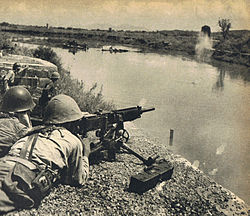Battle of Changsha (1941)
| Second Battle of Changsha | |||||||
|---|---|---|---|---|---|---|---|
| Part of the Second Sino-Japanese War | |||||||
 A Japanese soldier firing a Type 92 Heavy Machine Gun across the Miluo river in September 1941 | |||||||
| |||||||
| Belligerents | |||||||
|
|
| ||||||
| Commanders and leaders | |||||||
|
|
| ||||||
| Units involved | |||||||
|
|
| ||||||
| Strength | |||||||
|
300,000 30 divisions 631 artillery pieces[1] |
120,000 troops 46 battalions 326 artillery pieces[1] | ||||||
| Casualties and losses | |||||||
|
Ninth Military Front :[2] Sixth Military Front : 224 officers and 7,812 soldiers killed 579 officers and 10,125 soldiers wounded 17 officers and 721 soldiers missing 2 officers and 15 soldiers casualties (unspecified) Total : 822 officers and 18,673 soldiers killed, wounded, or missing. Fifth Military Front : 31 officers and 721 soldiers killed 57 officers and 1,127 soldiers wounded 13 officers and 606 soldiers missing 73 soldiers casualties (unspecified) Total : 101 officers and 2,527 soldiers killed, wounded, or missing Total : nearly 100,000 |
1,670 killed Japanese infantry companies who participated in the battle estimated to have suffered 60% casualties (based on an estimate from a company commander's assumption of 35 deaths out of his 200 troops before participating in the Third Battle of Changsha)[5]. According to division commander Eitaro Uchiyama, the 13th division was on the verge of being wiped out in the Yichang offensive, to the point of preparing the suicide site for him and senior officers of the division and being ready to burn the flag of the 104th infantry regiment[6]. 65th Infantry Regiment suffer serious casualties, with 213 killed in action according to the military history compiled by war veterans of the regiment after the war[7]. However, based on the number of supplements and the number of people added, the number of people killed in action was much higher than 213. 2nd Independent Mountain Artillery Regiment had a reduction of about 350 personnel from 25th May 1941 until 5th March 1942 (including losses from the Third Battle of Changsha and non-combat losses)[8] | ||||||
The (Second) Battle of Changsha (6 September – 8 October 1941; Chinese: 第二次長沙會戰) was Japan's second attempt at taking the city of Changsha, China, the capital of Hunan Province, as part of the Second Sino-Japanese War.
The Japanese were repulsed again, and the battle ended with a Chinese victory.
See also
[edit]- Battle of Changsha (1939)
- Battle of Changsha (1941–1942)
- Battle of Changsha (1944)
- Battle of Changsha (TV series), the TV series depicting this event
References
[edit]- ^ a b c Japanese Monograph No. 179, Central China Area Operations Record 1937-1941 pp. 265
- ^ 抗日战争湖南战场史料(二). 2012. p. 243.
- ^ 國史館檔案史料文物查詢系統,陳誠電蔣中正何應欽第六戰區襄西攻勢作戰各部隊人員傷亡報告,典藏號:002-090200-00071-042 [1]
- ^ 第六戰區荊宜攻勢作戰經過概要:附表一至七附圖一至五,典藏號:008-010701-00046-006 [2]
- ^ "川军围歼日本山崎大队,绝望日军用手雷集体自杀". 鳳凰網. 2017-08-05. Archived from the original on 2023-12-17. Retrieved 2023-12-17.
- ^ 日本防衛廳防衛研修所戰史室編撰;廖運潘譯.《日軍對華作戰紀要叢書 3 初期陸軍作戰:歐戰爆發前後之對華和戰》,臺北市 : 國防部史政編譯局, 民76,p562
- ^ 星半三郎編,《若松聯隊回想錄》,1977年,會津若松市:若松聯隊記念事業實行委員會,p179-182
- ^ “Brief History of Central China Area Unit (Part 5) / Partition 3” Japan Center for Asian Historical Records (JACAR) Ref.C12122443800, Brief History of Central China Area Unit (Part 5) (National Institute for Defense Studies)
